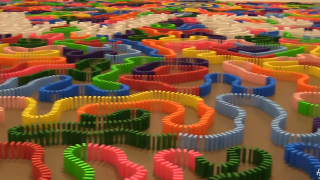
If you were diagnosed with a terminal disease, would you plan to have your brain frozen in the hopes that one day, either decades or centuries from now, you could have your brain thawed and somehow live again? All over the globe, advances in neuroscience are giving those who hope to one day live again the chance to resurrect themselves — blurring the lines between science and religion in the process.
The vast majority of people on Earth believe that once they pass away, they face everlasting life. Muslims, Jews and Christians, among others, believe in an afterlife. Science, however, is offering people a potential shot at immortality. Modern neuroscience is starting to uncover the connections between individual neurons and how they make up a person’s memory and identity. Basically, these neurons are what make you an individual. Some might call them your soul.
This science is advancing by leaps and bounds every week. The world’s first head transplant is scheduled to take place in December 2017, a procedure that could be a complete game-changer in the field.
Cryogenics isn’t exactly new. People have been freezing themselves or their brains for years, but the science is still in its infancy. Despite this, the field is offering hope for people who hope to one day be resurrected and live a life that was cut short due to illness or accident.
Most of us dream about being reunited with lost loved ones in some form of afterlife. Usually, that afterlife is associated with a religion, but now science might be on the cusp of making that a reality — right here on Earth.
The Obama administration has asked for $4.5 billion to be invested into brain research over the next decade, a huge influx of cash in an area that has too often been overlooked. Scientists are already thinking about the future of neuroscience, and experiments on animals have been largely promising. The question is: How far should they go?
The issue of science versus religion has been an ongoing battle for centuries. The Catholic Church, for example, used to suppress science in an effort to preserve their power. Humans used to think God lived in the sky and Hell resided beneath their feet. We know now that there is no Hell under the ground, and that an ever-expanding universe lies beyond our skies. We know the universe started and that it will end, but still religion has persevered on Earth because we want to believe in something after death.
One might argue that if the advances in neuroscience continue, they really could offer an afterlife — only it would be here on Earth and not in a heavenly realm. What would the various religions around the globe do then? Would science officially become the new God? If there is an afterlife, would preserving yourself by cryogenics ultimately deny you everlasting life or reincarnation, or whatever it is your religion believes? Is death part of an ultimate plan, a grand design by a higher being?
This won’t be the last time that science and religion have butted heads. This, however, is the first time where science is entering the realm of preserving our very essence, our makeup, and essentially offering a potential role, if they ever figure it out, of playing God.
 Share
Share









